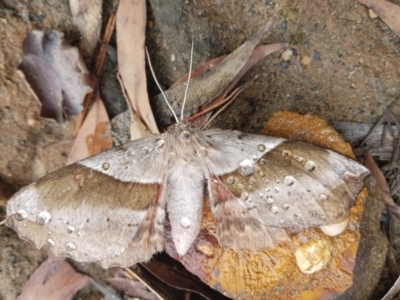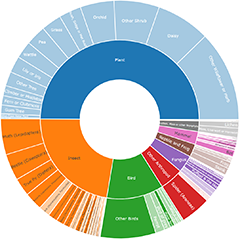Moths (Lepidoptera)
Useful references:
- CSIRO's Australian National Insect Collection (ANIC) - Australian Moths Online
- Don Herbison-Evans web pages:
In the notes provided about individual species, semi-technical terms are sometimes used. They are briely explained below.
Labial palpi. These are paired appendages extending from the lower part of the head, on either side of the proboscis. They provide important information about the family of the moth.
Parts of a moth’s wing:
Costa: The leading edge of the wing
Inner margin: The trailing edge of the wing
Termen: The outer margin of the wing, connecting the costa to the inner margin
Apex: The leading tip of the wing, where the costa and termen meet
Tornus: The trailing corner of the wing, where the termen and inner margin meet
Cilia. Long hairy scales along an edge of the wing
Announcements
There are currently no announcements.
Discussion
https://biocache.ala.org.au/occurrences/0fc77ed4-e78a-4071-acaa-84d5f6dddf24
Merocroca automima
Antasia flavicapitata
Significant sightings
- Anthela addita at West Hobart, TAS
- Proteuxoa sp. (03) (MoV, Part 9) at Harrison, ACT
- Androchela newmannaria at Crowther, NSW
- Hymeninae sp, (2) (MoV) at Bulli, NSW
- Nola tornotis at Bulli, NSW
- Rehimena surusalis
- Earias smaragdina at Rosedale, NSW
- Prepalla neurotenes
- Scoparia plagotis at Thredbo, NSW
- Stathmopoda cyanopla
Top contributors
- kasiaaus 5.9K
- jb2602 3K
- PJH123 2.7K
- WendyEM 2.1K
- AlisonMilton 1.8K
- ConBoekel 1.8K
- Hejor1 1.6K
- Bron 1.2K
- SteveBorkowskis 1.1K
- GlennCocking 1K
Top moderators
- donhe 17.8K
- ibaird 15.6K
- GlennCocking 3.4K
- DianneClarke 1.8K
- WendyEM 1.5K
- MichaelMulvaney 730
- JulieMorgan 183
- MichaelBedingfield 172
- kasiaaus 130
- KimPullen 96















































































































